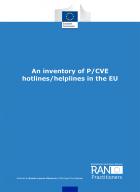Details
- Publication date
- 25 February 2022
- Author
- Directorate-General for Migration and Home Affairs
- RAN Publications Topic
- Local strategies/cities
Description
The aim of this paper is to provide an overview of the currently existing P/CVE hotlines/helplines in the EU Member States as well as the United Kingdom (UK) and provide practitioners working in P/CVE and adjacent fields with a helpful feature to search for relevant hotlines/helpines in their country and receive information about the support services available in their country.
The paper looks into whether these services are provided by state or civil society actors, where the helpline/hotline services are geographically located and which areas they cover. It further offers brief descriptions of the help/services offered by the hotline/helpline along with all available contact information, including phone numbers, email addresses and online forms to fill in, in order to receive advice and support. Website addresses of the hotlines/helplines as well as working hours are also provided where available.
The hotlines/helplines are listed in alphabetical order of countries. The list aims at covering the most important hotlines/helplines but should not be considered exhaustive. Some of the main insights and recommendations from taking into consideration all hotlines/helplines identified in this paper are:
- Hotlines/helplines on P/CVE issues are established in 18 out of the 27 EU Member States, as well as in the UK. Where this is not the case, it would be advisable to have a designated police number to call if in need of advise, information and support.
- Helpline/hotline websites should be easily accessible and easy to navigate. Writing simple key words such as ‘hotline/helpline on violent extremism and radicalisation’ into a web browser should be sufficent to take a person looking for help to the right website through an internet research. Currently, this is not always the case.
- Helplines/hotlines could, where possible, also provide counselling or support services using minority community languages. There could be a reference made that an interpreter will be called-in if need be. This could, in addition, increase access to and usage of services.
- Helplines/hotlines on P/CVE throughout Europe, including countries that are not EU Member States, have a lot to share with and learn from each other. This could be facilitated through an umbrella association of all hotlines/helplines on P/CVE issues in Europe.

